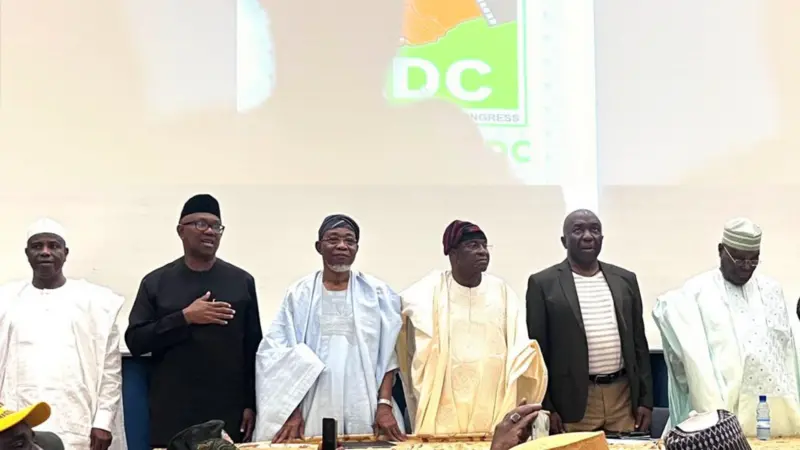
Temidayo Babatope Joseph alias Puffy Tee, belongs to the league of veteran music producers in Nigeria. A director of music, singer and producer for over two decades, Puffy Tee has made his mark in the music industry, spearheading the production of Olu Maintain’s national anthem, ‘Yahoozee’ in 2007. The music producer spoke to Newton-Ray Ukwuoma about life after his first hit song, among other things.
I have been coping well. However, things can’t compared to what is happening now. Then, there were few hits songs. You might just be the only one with a hit song for a year or two. But now it’s different. The success in the industry is bigger than what it used to be. There is more money now and more players in the industry. I’m coping okay. In the midst of the whole thing, I’m still here.
Does it mean you feel challenged by the young producers? Yes, of course. It’s not as if I don’t hear beats; lovely, crazy and creative crafts from these boys. They are really doing well because music production is different now. Before, if you don’t have all the gadgets and all the major set-up, you can’t make some beats. If you don’t go to a major studio, you can’t record. But, now you can even record in your bathroom because you have just a laptop. As you can see here, my set-up is very small at least for my mobile studio. So, I won’t really say that I feel challenged by what the younger ones are doing. I have never seen myself as being long in the game. I always see myself as a new comer, I just see myself as just arrived, like I just started. There is no competition, no challenges because anything they use, I use, anything they know, I know. However, their approach to a song is not my style. At the end of the day, I’m happy with the way the industry is going right now. It’s a wonderful step. The beat makers are happy with the industry right now.
Do you have an edge above these young producers? For producers, sound engineers and artistes abroad, the older the better because you’ve heard songs back in the days. You’ve made music back in the days before they started coming up. They always say this adage in Yoruba, you can have clothes more than an elder but you cannot have more rags than the elders. sO, experience is key. Some of them don’t even know what Tommy Hilfiger was in those days. Some of these new producers don’t know what Atari is or what kickwork pro is.
But they know fruity loops or what lotus is and I know it too plus the others. And this knowledge and experience give me a special edge over any super star beat maker right now.
What’s your take on us having great music but no lyrics? The things is, first, we do not have any record labels in Nigeria. We have money making companies. People that want to make money and artistes are desperate. You go on the street and see an artiste that is trying to come up and has good talent. You bring him to the studio, the next thing, he’s recording. Because the artiste is desperate, he starts singing.
There’s no structure. Normally in an organised setting, a record label will have songwriters, costumiers, stylists. They will have PR, they‘ll have managers, personal assistants. An artiste has about thirty people working with him because of different areas to make the artiste a brand. The only thing the artiste does is, he goes into the studio, performs and go for rehearsals. And go to gyms and go to shows. But here in Nigeria, we find the artiste writing their songs, you find the artiste promoting themselves, they source for money to push themselves. So, there’s too much pressure on every upcoming artiste. And these days, songwriters in Nigeria don’t sell anymore. During the time of Sunny Ade and Onyeka Onwenu, there were song writers. Now, it’s always beats before songs. A producer will make a beat first and an artiste comes, ‘Omo dis na correct beat’ and starts free styling on it and that’s it. It becomes a song. Gone are those days when you see an artiste with a guitar and notebook where he writes the songs but now you don’t even see them writing anything anywhere. They just go into the studio asking, ‘Bros. which beat you get for there? Ahh I like this song, this song is bad!”.
The next thing is free style. So what people do these days is listen to beats first. Before, there is nothing like beat first. You take your song to the studio, a producer listens to your song, score your songs, produce, make a beat or make an arrangement for the song, then you come and sing on it. It doesn’t happen anymore until we go back to writing, having a proper structure about recording, signing artistes, having proper record labels in this country; we’ll never get better in this country.
Our music will always be mediocre, we’ll think the music is everywhere but it’s only in between Nigerian communities all around the world. So many kids cannot even learn from our Nigerian songs these days. They can’t learn from it. There are some songs I can’t even allow my daughter to sing. But before, you can sing any song and your parents are happy you are singing it. But this time around it’s different because as the world is moving faster, we are moving with the world. We are trying to join the train. For me, until we build that structure and not everybody is a musician, not everybody is supposed to put their songs on radio or TV.
What of producers becoming musicians these days? The thing is here, most music producers that are now musicians were singers before turning producers. Some of them grew up in a church where they played keyboard and sang in the choir. Some of them have been in different bands. For somebody like me, I was the music director of a church for 15 years. Evening when I was in London, I was training choirs. For someone like me who trained people how to sing, it means I can sing. I played the bass guitar, drums and keyboard. So, it’s something they had in them before producing. Most producers give artistes ideas when it comes to the song.
If a song is very good, know that the producer has 40 per cent or 60 per cent input or idea in that song. As a producer, I do back up in the studio. That why most of us sing. There was money in the industry the way it was before. Again the way the industry is, you take your time, you put your energy into an artiste, your strength, your sweat, ideas working with an artiste for a month to finish a project. The next thing, you start making money with that project, and they don’t come back to you. Most of the time, we don’t really sign contracts. We work based on ‘let’s just do it’.
If you push a contract to them, they‘ll run away but because you just want to have that personal rapport you say, “Let’s work for now” and you want to do the work. And as you work, you keep enjoying the company, “Let’s do more, we are together now,” you say. And the next thing, they go off with all your time. So we do our thing. We know all these artistes, have worked with them and know their strengths. But if they don’t appreciate it, I pick up the microphone and sing my song. ‘Because the beat wey you dey use to make money, na me do am’. So I do my own and make my own. We also have families to feed. It’s not only the artistes that have responsibilities. We have our own too.
An artiste is an artiste purely and a producer is a producer. If a producer decides to sing it’s not because they can’t be successful in it. If I sing, I want to make money, which is the idea. Secondly, I want to up my profile. ‘Puffy Tee, he’s been a producer for a long time’. He’s trying to change and add something else to his profile. I can’t just be a producer for the rest of my life; I have to do something else, something a little different from what I’m doing in the industry. Maybe after some years now, Puffy Tee may become a video director or an actor.





















